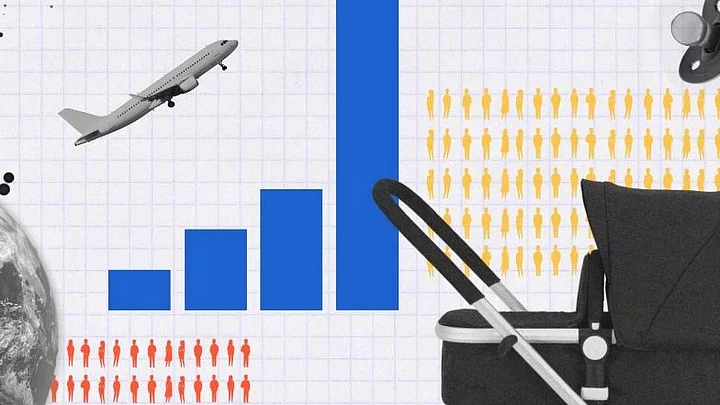The human population is expected to reach 8 billion literally any day now, and nearly 10 billion people sometime this century.
With the planet also swiftly approaching 1.5° Celsius (2.7° Fahrenheit) of warming above pre-industrial levels, activists and scientists are urging any solution to keep temperatures from shooting higher into the danger zone.
Research suggests that the single biggest thing anyone can do to reduce their impact on the environment, and the climate, is to choose to have one less child. But that simple solution is complicated by thorny economic, ethical, social, and political issues.
On this episode of Problem Solved, we unpack the research, and examine this sensitive and controversial question: Is choosing collectively to have fewer children really a viable solution to our climate change and/or resource overuse crises?
“Should I have kids?” is an age-old question, but the urgent context we find ourselves in today isn’t, as we climb rapidly toward 1.5° Celsius (2.7° Fahrenheit) of warming above pre-industrial levels due to human-made carbon dioxide emissions.
Our population is expected to peak sometime this century at 9.7 billion people, according to a recent Lancet study, and we’re already knocking on the door of 8 billion.
These stats feel overwhelming to many potential parents out there, and some are considering forgoing parenthood altogether. But there are many perspectives on this issue, and complex matters involved in making this momentous decision.
To explore this deeply personal question from several angles, we spoke with a climate scientist, a climate change journalist (who wrestled personally with the question), and a reproductive rights NGO specialist working in India, to hear their perspectives on whether to have – or not to have – children in a world with a rapidly growing population, changing climate, and finite resources.
Watch here:
Above all, this is a question we must answer for ourselves, and one that cannot be examined in a bubble, or easily settled. I’m in a phase of life where I’m deciding whether to start a family.
And while this decision is by no means the hardest for someone like me (for many reasons covered in the video), I must confess, I’m finding it far harder than I thought I would. I am not alone.
As a concerned environmental journalist, and someone coming at this from a privileged perspective, living in a highly industrialised and wealthy nation, I know that my choice will have repercussions: My decision to have a child will certainly have a larger environmental impact than the same decision by someone who doesn’t have the same privileges and income as I do – and someone whose children won’t use as many resources as mine would.
In any instance, bringing another human into the world, no matter where, will contribute to a variety of personal, social, and environmental outcomes.
So I wanted to find out the potential consequences of these impacts, and especially whether asking people to simply have fewer kids was truly a viable solution to mitigating those effects.
The seeming simplicity of this question doesn’t fully account for the outsized contributing factors or complications that must be weighed before forecasting a future – factors we cover in this film: What about tackling humanity’s systemic dependency on fossil fuels, for example?
Or what about the moral contradiction imposed by asking residents of lower-income or less-industrialised nations to have fewer kids, in essence, to pay for the environmental toll of higher-income individuals? What if your nation doesn’t allow you to legally choose when and if you carry a pregnancy to term?
What if your nation has insufficient reproductive health care access, or a severe lack of gender equality and economic or educational opportunities?
How can we fairly allocate resources, implement policy, and create infrastructure so that women and families can freely and fairly choose when and if they have a child? How can we provide equal access to educational and economic opportunities regardless of our choice?
These are not easy questions, and this is not an easy situation we find ourselves in. But if you are someone wrestling with this dilemma, or someone who wants to know what they can do to improve life for people trying to make this decision, we hope this video offers some food for thought, and some hope for our shared future.
(This article was originally published on Mongabay. It has been republished here with permission.)
(At The Quint, we question everything. Play an active role in shaping our journalism by becoming a member today.)
